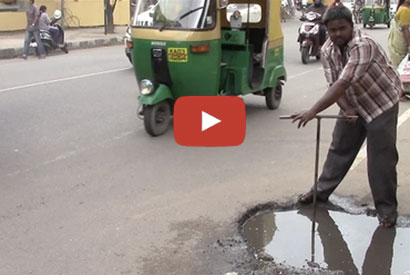Grad student helps people in Bangalore know when the next drop of water will come
Many of the 9.9 million people in Bangalore, India, never know when they’ll turn on the tap and find water flowing. UC Berkeley graduate student Christopher Hyun is helping to change that.

December 15, 2014
Many of the 9.9 million people in Bangalore, India, never know when they’ll turn on the tap and find water flowing. Water is scarce and rationed. Each household gets about 4.5 hours of running water every other day — but when, and if, the water runs can be unpredictable. While high-income households can afford tanks that automatically turn on when the water does, low-income households cannot, meaning that women can devote hours on a weekly basis to waiting for and storing water.
UC Berkeley graduate student Christopher Hyun spent his summer working on a research project examining how the people of Bangalore can get more reliable and timely information about when and how long they’ll get water each day. He’ll be returning to Bangalore during the winter break to continue the work.
“In the developed world, we’re used to just turning the water on, and it’s there. We don’t know how it got there,” says Hyun, who is part of the Energy and Resources Group, an interdisciplinary graduate program. “I have a passion to see people having water.”
The research project was prompted by the work of Nextdrop, a tech startup founded by UC Berkeley graduates, among others.
Nextdrop has developed a system using cellphone text messaging to connect them with the service workers who manually open and close valves controlling the water. Nextdrop then sends residents text messages when water is coming.
After testing the service in a small city, Nextdrop was ready for a city the size of Bangalore. Its partner there, the Bangalore Water Supply and Sewerage Board, has asked Nextdrop to offer services throughout the city.
Funded through a grant from the Development Impact Laboratory, which is co-managed by the Blum Center for Developing Economies and Center for Effective Global Action at UC Berkeley, the research project examines the effectiveness of Nextdrop’s system in Bangalore. The project is led by Alison Post, assistant professor of political science and global metropolitan studies, and Isha Ray, associate professor in the Energy and Resources Group.
Hyun’s field work in Bangalore focused on the “valvemen,” the service workers who not only control the water valves in the neighborhoods but also inform Nextdrop about the water schedule. Hyun’s role is to understand when valvemen are willing to share accurate information with Nextdrop. Hyun learned that there are many obstacles the valvemen must overcome in their daily work.
Political science doctoral student Tanu Kumar is working closely with Post and Ray to assess the impact of Nextdrop’s notifications to households on their welfare, including how much time they spend waiting for water, earnings, stress levels and how they relate to the government.